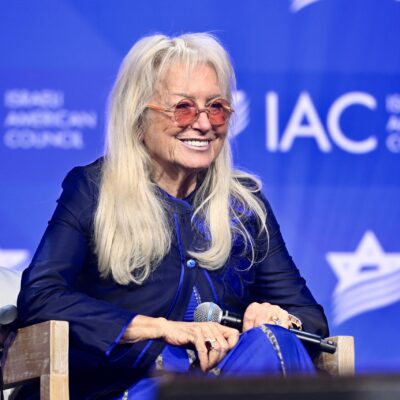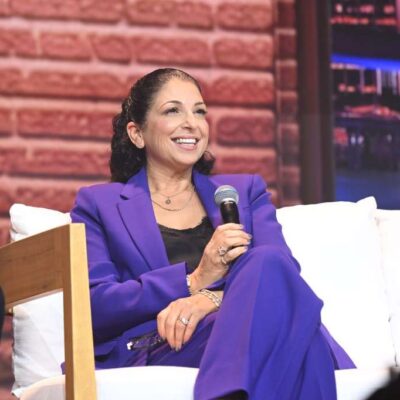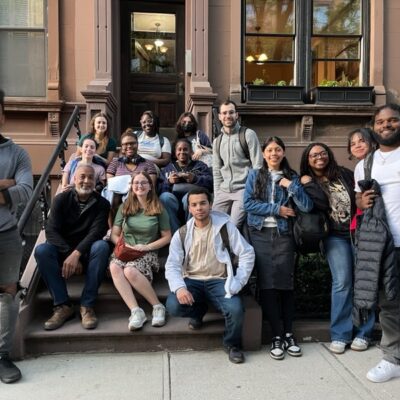Opinion
Making a Difference
 By Cindy Chazan
By Cindy Chazan
[Cindy retired earlier this year after spending almost 18 years with the Wexner Foundation. This is the final lecture she gave to the Alumni of The Wexner Graduate Fellowship.]
I grew up in Montreal in an immigrant family – my father was the first to be Canadian born and my extended family continued to live the European experience in Canada. With this background came both incredible stories and huge challenges. I am a product of day school, summer camp, youth movements, like BBYO, and Zionism was part of our family and community DNA.
I knew early in my adolescence that I wanted to work in the Jewish community and aspired to positions of leadership like those peers and counsellors I admired.
Leadership emerges from one’s own life stories – your family, life experiences, coaches, teachers, friends, youth group leaders, counsellors at camp and the best mentors one can find, regardless of gender. Sometimes leadership is strengthened by wanting to prove oneself. In my own personal narrative, I grew up in a family that didn’t believe in praise. Perhaps it had to do with tempting the evil eye, and/or being part of the immigrant experience of pushing the next generation towards success, and not settling for less.
Fortunately for me, I had the opportunity to make sure my children knew how proud we were of their achievements – big and small, and never failed to be present in their lives.
So even though I was asked to limit this lecture to Ten Leadership Lessons, I can tell you there will be more:
- Claim part of the day for yourself.
- Don’t feed into a perpetual cycle of self-criticism or criticism of others. Research tells us it takes 5 praises to counteract the impact of just one criticism from yourself or from others.
- Women tend to see mistakes more as personal failure. but, they can be valuable if you learn from them; make sure there are other dimensions of who you are and things that you do.
- Don’t wait till you’re in your 60’s like I did to begin exploring what the next phase of your life will be; may we all live longer!
- Swap your to-do list with your to-be list.
- Use visualization to get through an anxious time.
- Remind yourself: it will get done and anxiety won’t make the end product much better.
- Be intelligent, warm, and courageous.
- Practice human gestures of forgiveness, caring and compassion make a deep impression on others and keep you healthy.
- Email is easy to read and to misread – pick up the phone! So much better.
- Listen well and never check your email while in meetings with others – it is impolite, isolating and downright rude – unless you tell the person in advance that there is a problem and you are anticipating an email.
- Build a living, breathing and creative Jewish work setting.
- Take seriously the power of ideas – a vision without a plan is just a dream. I always think about my big dream; my mission: what am I going to do about it.
- “You’re only as good as what you share with others.”
- Always keep your eye on the ball of personal and professional growth for yourself and for the sake of individual, organizational and communal change.
- Never catch anyone by surprise, try not to get blindsided, even if you’re not in control.
- Be a change agent. I personally was afraid of change and needed to transform myself into someone who at least appeared convincingly enthusiastic and unafraid; I am still trying.
- Learn to orchestrate real change – but don’t go it alone; mutually respectful lay-professional relationships are critical.
- Humility breeds growth – it is more important to be humble than to be proud.
- Be hopeful, optimistic and ethical.
- Do not be one dimensional.
- Challenge yourself always; reflect by thinking of models of leadership – revolutionary and/or visionary who anticipates the potential of community beyond the present.
- A good leader moves people to do what they need to do for the greater good.
- She is intuitive, curious and gutsy and cares in a very deep way where she believes the organization and its constituents can go.
- A good leader anticipates potential – and risk.
- Paralysis can create new problems. If I will be happy sustaining what I have or how I lead, knowing that it’s easier to hunker down than change, I run the risk of being stale and not adequately preparing for the future.
- A good leader needs to be able to articulate a vision and potential to people who may not yet have the capacity to fully grasp it – yet!
- Be patient and don’t go it alone. Develop allies to bring along with you.
- Change at the rate that individuals can absorb – per Marty Linsky and Dr. Ron Heifetz.
- Be empathetic.
- Be a participant in what community can be, not just a voyeur.
- Know when to get on and off the balcony. Even executives get their hands dirty – don’t think of yourself as above removing the plastic wrap from the food before the board meeting – or making sure that extra chairs are stacked in case more people come.
- Anticipate needs.
- Moses said, “I am not sure they will listen to me.” One sign of leadership is that you doubt your own ability.
- Moving away from external validation is not easy. What makes a leader humble is not self-negation or self-doubt, but it is taking risks, listening to criticism and/or new methods to become better.
- How do you want to be remembered? Did you prepare well, did you work hard, did you treat people the way you want to be treated? Did you mentor and supervise and LISTEN? What role-models and mentors do we carry with us? How do we channel them? How do we thank them?
- Honor both tradition and innovation. Not everything old needs to be jettisoned. Think of consequences of both change or no change.
- Deepen your knowledge of Judaism and the Jewish community.
- Acknowledge that you need business management skills.
- Get a tutor to teach you what you don’t know, like reading a spreadsheet or fundraising skills.
- Build trusted relationships with laypeople and staff.
- Promote productive work by leading by example. What are you teaching a staffer if you yourself never got back to her with the answer she needed?
- Ensure teamwork and collaboration not just for collaboration’s sake.
- Have integrity, credibility and presence.
- Practice genuine gratitude.
- If you don’t ask you don’t get – and chances are better that you will get if you’re good. It’s easier to ask for an accommodation if you have proven you bring value to the organization.
- Continuously learn, becoming more self-aware all the time.
- Communicate more effectively – no blame game or “gotcha” or whining.
- Inspire others and allow them to take the credit.
- Keep your sense of justice and kindness and loyalty.
- Be generous and treat people fairly; stand by them when they need you even if it doesn’t always come back to you.
- Be approachable.
- Be accountable.
- Have broad shoulders.
- Choose your battles. Know when to lose or back off.
- Know when to seek advice.
- Find allies and genuine partners.
- Sincerely care about the growth of your staff.
- Practice being a good negotiator.
- Don’t be afraid to practice an interview with each other or with staff.
- Admit to all that loss is hard.
- Do not be afraid to genuinely say I’m sorry! We all still need to work on that.
- Be a mensch.
- You can’t fear conflict if you want to move forward.
- Share the credit – applause for all.
- Balance between being optimistic and realistic.
- Have broad band-width.
- Communicate – how many hours do we spend worrying we’ve somehow wronged someone when their mood has nothing to do with you?
- Share accurate information in a timely manner with colleagues and lay leaders, even if it means telling them you have to do research in order to get back to them with the right answers. Withholding valuable information is often a sign of misused power, e.g., constantly forgetting to copy a colleague, or, consciously keeping him out of the loop is power ill-used.
- Internal and external problems need to be openly and non-defensively discussed.
- Set measurable goals and objectives.
- Under-promise and over produce.
- Let others shine – spur each other on to be more daring and exult in their success – be supportive and loyal. Being loyal to your staff doesn’t guarantee they’ll be loyal to you; but being disloyal guarantees that they will be disloyal to you.
- Accept that there is not a level playing field of hierarchy – nor do we all have the same expertise or authority.
- No cookie-cutter leadership style.
- Be authentic and effective; empower people, recognize that leadership is not always about your success.
- Be authentic – you do not have to wait for a tap on the shoulder or be at the top of the organization to take risks; risks are sometimes scary or imperfect. I will never look back with regret. I am richer for every chance I took.
- Be approachable.
- 75 members of Stanford’ business school said that self-awareness is key to healthy leadership.
- Make time for what Les Wexner calls becoming a “whole person”; take care of yourself. We forget about self-care.
- Be nimble and brave – knowing your authentic self requires courage and honesty.
- You may have to become more vulnerable and still come out stronger.
- Denial can be one of the greatest mistakes that leaders make.
- Expect that there will always be egos to be stroked, insecurities to smooth, fears to allay.
- Stop being a martyr or victim. Use your network for help. No blame game. You have no idea how lucky you are to have this network of professionals some of whom you practically grew up with. Use it!!
- Network, network, network. Have a mental rolodex of people and don’t be afraid to ask for help.
- Cultivate a sense of humor, ability to laugh with others and at ourselves.
- Respect diversity and one another. Stimulate others to think and create their own values.
- We share a common purpose – burdened with responsibility – blessed with opportunity to pay it forward – to be wise agents of change, to mentor others, and there is so much work to be done.
- Create your own personal feel good file of notes and emails to open when you’re feeling crummy.
- Try, try, try not to take criticism to heart.
- How fortunate is the Leader who has staff, friends, lay leaders and colleagues to call on for help.
- Some people come into our lives and quickly go. Some stay for a while leaving footprints on our hearts, and we will never be the same.
The purpose of retirement is not simply to exist, to simply survive; but to elevate oneself in life, to have purpose, to achieve and reach new goals. for me: consulting, drawing, learning Talmud with a teacher, trying to work out more[!] going to a place for a chunk of time and exploring that place. I have entered with my husband Jay a new stage of opportunity.
You are probably going to live a whole adult lifetime that wasn’t available to your parents or grandparents, so start thinking now about your “whole life.”
Never forget what a privilege it is to work for the Jewish People and that we are all engaged in the holy work of making a profound difference in people’s lives. I have been so fortunate to work with great colleagues and supervisors and my gratitude to Rabbi Elka Abrahamson, President of The Wexner Foundation, Les and Abigail Wexner who allowed me to phase in retirement, and my colleagues all over the world as well as my precious family is enormous and forever.
Cindy Chazan served most recently as Senior Advisor at the Wexner Foundation. As Vice President, she facilitated collaborations among the Wexner Leadership constituencies in North America and in Israel, developed Partnership Communities for the Wexner Heritage Program and engaged Jewish communities in greater leadership development activities.
Cindy is currently consulting part time to Jewish community organizations on long range planning, Board and staff development, and Major Gifts solicitation planning. She works as a Mentor for the Mandel Foundation, and worked with both NY UJA-Federation and The Jewish Federation of Greater Philadelphia.

 Add EJP on Google
Add EJP on Google










